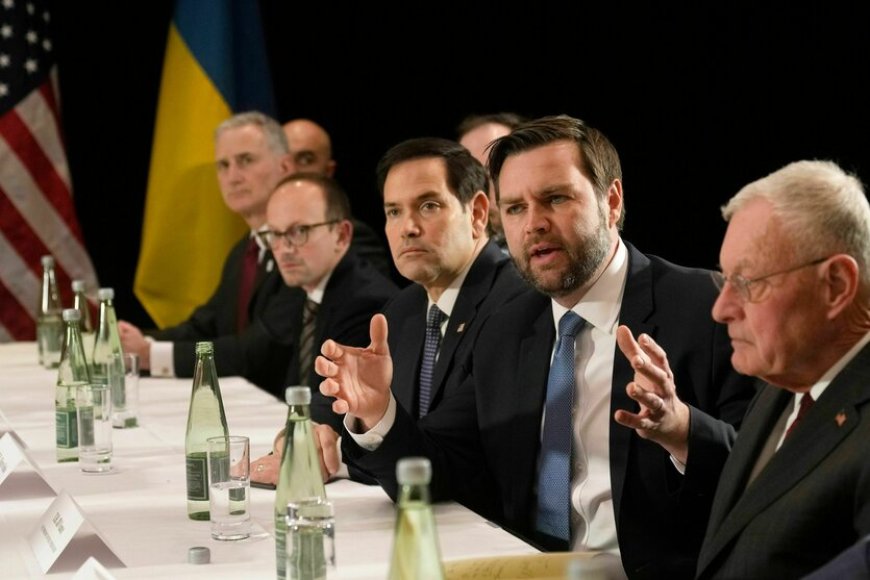talks at the security conference
Negotiations continue on the last day of the Munich Security Conference. Paris confirms a meeting of the most important European heads of government.

The French government has confirmed that a European summit on Ukraine will take place in Paris on Monday at the invitation of President Emmanuel Macron. French Foreign Minister Jean-Noël Barrot told France Inter on Sunday. According to European diplomats, France, Great Britain, Germany, Poland, Italy, Spain and Denmark will take part in the meeting.
Denmark will represent the Baltic and Scandinavian countries. The meeting follows the US announcement that there is no room for Europe in the planned negotiations with Russia to end the war in Ukraine. This caused incomprehension and massive criticism in Europe. At the meeting in Paris, the Europeans now want to define their common positions. ( reuters )
Russia speaks of a “turning point” in the negotiations
Russia is talking about a major turning point in relations following the telephone conversation between President Vladimir Putin and US President Donald Trump. Russia and the US are now talking about peace and not war, presidential spokesman Dmitry Peskov told a state television reporter in a video clip released on Sunday.
"This is a strong signal that we will now try to solve problems through dialogue," says Peskov. "Now we will talk about peace, not war." Peskov stresses that the first meeting between Putin and Trump has a special significance under the current circumstances. Nor would the Western sanctions prevent talks between Russia and the USA, as they "could be lifted just as quickly as they were imposed." (rtr)
Finland: Ukraine's accession to the alliance "non-negotiable"
Against the backdrop of possible negotiations on an end to the war in Ukraine, Finnish President Alexander Stubb has insisted on Kyiv's membership in the EU and NATO. Ukraine's accession to both alliances is "non-negotiable," Stubb said on Sunday at the Munich Security Conference. "This is a decision for the Ukrainians," he said.
The process of Ukraine joining the EU has already begun, argued the Finnish president. "Ukraine will become European, not Russian." This is already a "great loss" for Russian President Vladimir Putin. NATO membership will follow at a different time.
US President Donald Trump had a one-and-a-half hour phone call with Russian President Vladimir Putin on Wednesday without consulting the Europeans beforehand. Trump then announced that he had agreed with the Kremlin chief to begin negotiations on the future of Ukraine "immediately". This raised fears among Western allies that Ukraine and its European partners would be excluded from the Ukraine talks. (rtr)
Stubb explains three-stage peace plan
Stubb said that the Europeans must show the US what they can contribute to the process. "It's our turn," said Stubb. "If negotiations take place, Europe needs a special envoy, the Finnish president suggested. In this way, Europe can get back into the game.
He sees three stages for a peace solution for Ukraine: The first stage is to make Ukraine strong enough for negotiations. To do this, weapons must be delivered and the frozen Russian assets must be discussed. Only the second phase would be a ceasefire under international supervision. The third stage would then be peace negotiations, which would deal with reconstruction and territorial issues. It is non-negotiable that Ukraine itself decides on its desire to join the EU and NATO. In addition, Russia must not have any influence on what a future European security architecture looks like, warns the Finnish president. (rtr/afp)
Poland: Rejection of European army
Poland's Foreign Minister Radoslaw Sikorski has rejected calls by Ukrainian President Volodymyr Selenskyj to form a European army in response to threats from Russia. One should be careful with the term "European army" because it is understood in different ways, Sikorski said in a TV interview. There will not be a union of national armies. However, he is in favor of the European Union developing its own defense capabilities. If the USA wants Europe to make progress in defense, this should have a national component, a NATO component, but also a European EU component. This should include EU subsidies for the defense industry to increase production capacity, "but also an EU military force that deserves the name," said Sikorski. He reiterated that the deployment of Polish troops in Ukraine is not up for debate because Poland's task in NATO is to protect the eastern flank and thus also to protect its own territory. (rtr)
Ukraine and China want peace talks
Ukrainian Foreign Minister Andriy Sybiha and President Volodymyr Zelensky's Chief of Staff Andriy Yermak said late Saturday (local time) that they had discussed Kyiv's vision of a path to peace in Ukraine with Chinese Foreign Minister Wang Yi. "We talked about the development of bilateral relations and trade.
We also shared Ukraine’s vision on the path to a comprehensive, just and lasting peace,” Sybiha wrote about the meeting, which took place on the sidelines of the Munich Security Conference.
China's Foreign Minister Wang stressed on Friday that his country believes that all parties involved in the Russian-Ukrainian conflict should take part in the peace talks. In doing so, he also underlined Europe's role in these talks. Later, the US representative for Ukraine, Keith Kellogg, refused to allow European representatives to sit at the negotiating table during the peace talks. (rtr)
Lavrov and Rubio want to remove "obstacles"
According to the Russian Foreign Ministry, Russian Foreign Minister Sergei Lavrov and US Secretary of State Marco Rubio want to remove the “unilateral obstacles” in their bilateral relations erected by the previous US administration.
According to the ministry, the two ministers discussed this and the topic of peace talks to end the war in Ukraine in a telephone conversation on Saturday (local time). During the call, which Moscow said was initiated by the US side, Lavrov and Rubio agreed to work on restoring a "mutually respectful interstate dialogue."













































